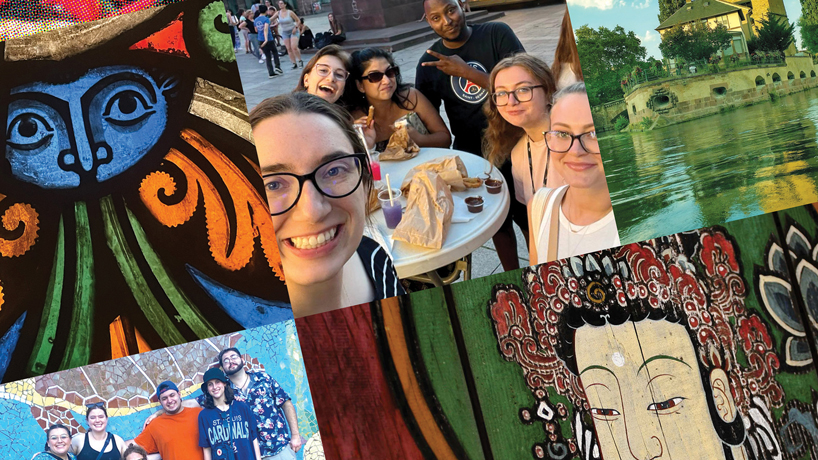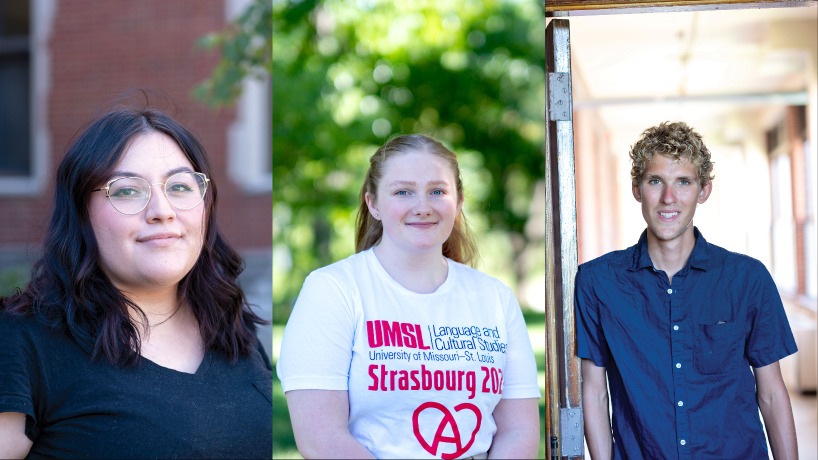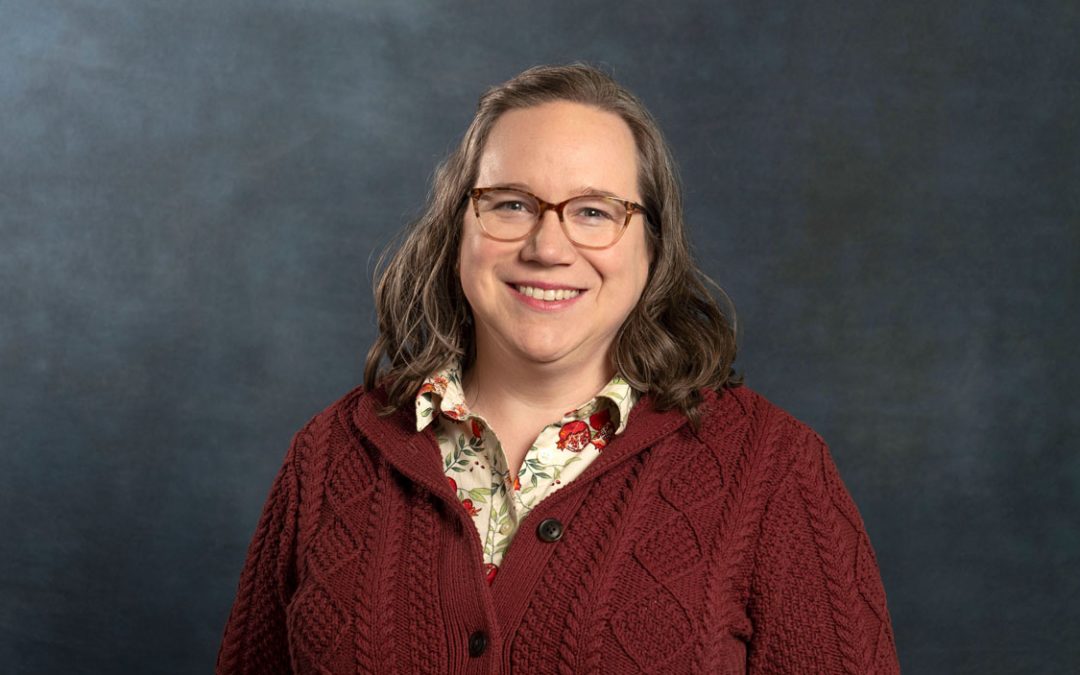
Over the years, UMSL’s nearly 70 study abroad programs have enriched the lives of countless students, providing transformative experiences across the globe. After a two-year hiatus due to the COVID-19 pandemic, a full slate of overseas programming returned, stretching from Spain to South Africa and South Korea to Costa Rica, and UMSL students were eager to see the world after months of online classes, quarantines and social distancing.
This summer, Jeannette Memmer stood in the shadow of the Cathédrale Notre-Dame in Strasbourg, France, taking in the Gothic architecture and the sculptures virtually leaping out of the sandstone façade.
More than 30 years ago, her mother stood on the same soil and even sang inside the thousand-year-old cathedral as a college student. For the University of Missouri–St. Louis junior, touching a living piece of medieval history – and family history – was a dream come true.
“My mom studied abroad, and it was a really influential part of her college career,” Memmer says. “She loved it.”
Memmer traveled to France as part of the three-week Strasbourg Study Tour offered through UMSL Global and the Department of Language and Cultural Studies. Over the years, UMSL’s nearly 70 study abroad programs have enriched the lives of countless students like Memmer, providing transformative experiences across the globe. Not only do students get to experience another culture; they also cultivate a sense of independence and self-confidence.
“It’s a personal growth that happens in a very short amount of time,” says Violaine White, associate teaching professor of French and co-director of the Strasbourg program. “It’s making this first step outside of your personal and national boundaries and your comfort zone, realizing that you can actually do it. In terms of growth, I think it’s an amazing experience.”
That is, until the onset of the COVID-19 pandemic in spring 2020. Many study abroad programs were canceled, and UMSL students taking part in long-term exchanges were brought back to the U.S. With little warning, an impactful element of the UMSL experience was forced into a holding pattern.
Annie Hyde, who has worked with UMSL Global since 2019 and was recently named manager of the Study Abroad office, saw the impact on study abroad programs and knew she wanted to help reestablish them as soon as safely possible.
As a study abroad alumna, Hyde is a firm believer in the academic and career skills students develop through the program. For months, she worked with UMSL Global and program leaders to ensure as many students as possible would regain access to these opportunities once restrictions began to lift.
Earlier this year, a full slate of overseas programming returned, stretching from Spain to South Africa and South Korea to Costa Rica, and UMSL students were eager to see the world after months of online classes, quarantines and social distancing.
“As we got into the current semester, the application cycles and advising with students, we saw there was a strong interest in international study opportunities and going abroad,” Hyde says.
Programming mostly returned to normal, starting with a two-week winter intersession program in Costa Rica led by Associate Teaching Professor of Spanish Amy D’Agrosa. White and her colleague Teaching Professor of French Sandra Trapani led the summer trip to Strasbourg, France, while Hyde joined the Pierre Laclede Honors College’s summer program in Germany.
Students (from left) Maria Osuna, Jeannette Memmer and Jamison Straulin took advantage of reinstated study abroad programs. Osuna traveled to Costa Rica during a winter intersession program and went on to study in South Korea during the the spring semester. Memmer took part in the three-week Strasbourg Study Tour, while Straulin went on a two-week program in Germany. (Photos by August Jennewein)
Memmer, a history and French double major, had never been out of the country previously. Her hopes of doing so were initially dashed in high school when a study abroad trip to France was canceled, so she jumped at the chance to join the Strasbourg program.
The three-week sojourn included numerous historical and cultural activities such as language classes, a cooking class, a tour of the Alsace Wine Route and a visit to the European Parliament. As a history major, Memmer’s favorite part of the program was visiting Château du Haut-Koenigsbourg, a medieval castle in the Vosges Mountains, and finding history around every corner.
“It was definitely surreal, walking to get a coffee and seeing something like Notre-Dame [de Strasbourg] just in the middle of the street, this beautiful symbol of French and German heritage,” she says.
Maria Osuna, a senior double majoring in French and Japanese, joined the Costa Rica program during the winter intersession at the behest of D’Agrosa. Taking classes at the Costa Rican Language Academy, touring San José and visiting the Pachira Lodge in the tropical rainforest only made her want to travel more.
Osuna went on to study at Chonnam National University in Gwangju, South Korea, for the spring semester, where she quickly forged friendships with several other international students. On weekends, the group regularly traveled to other parts of the country such as Busan, Jeju Island and Seoul.
One early morning trek in particular led to an indelible memory.
“In Yeosu, we traveled up 40 flights of stairs to get to a Buddhist temple,” she says. “Yeosu is second from Japan to see the sunrise, so we were able to see the sun rise completely over the ocean. It was very beautiful. That really stuck with me.”
Jamison Straulin, a junior in the Pierre Laclede Honors College studying education, took a class on World War II and the Cold War taught by Associate Teaching Professor Christoph Schiessl, which convinced him to join Schiessl’s two-week study abroad program in Germany this summer.
The program focuses on the history and memory of Nazi Germany and the Holocaust and takes students to historic sites in Berlin, Dresden, Munich and Nuremburg. In Munich, Straulin visited the Dachau Concentration Camp – the first built by the Nazi regime.
“It’s really an out-of-body experience to be standing in the middle of a concentration camp,” he says. “Even studying the Holocaust, learning about it, can’t come close to it, to really physically being there.”
Despite the somber subject matter of the trip, Straulin enjoyed the freedom to explore a foreign country. Memmer and Osuna did, as well.
They found it didn’t take long to adjust to their new surroundings. After a few days, Straulin dined alone in the largest cities in Germany, Memmer developed a morning routine, stopping by the same café for coffee each day, and Osuna navigated public transit like a local.
“It’s always exciting to see how [the students] evolve in a short period of time,” D’Agrosa says. “It’s not just language and culture. There’s a maturity that happens because they’re experiencing a different world.”
Trapani also points to the confidence-building inherent in traveling – something Straulin experienced firsthand.
“I gained a lot of confidence, kind of out of necessity, because I was in a foreign country with nobody that I really knew,” he says. “I had to gain the confidence to make friends, talk to people, try new things.”
The three students are already looking toward their next destinations, with some considering stays longer than a few weeks.
“By the end of the program, I felt like I could live there,” Memmer says of France. “I could feasibly make a life there.”
This story was originally published in the fall 2022 issue of UMSL Magazine. If you have a story idea for UMSL Magazine, email magazine@umsl.edu.















